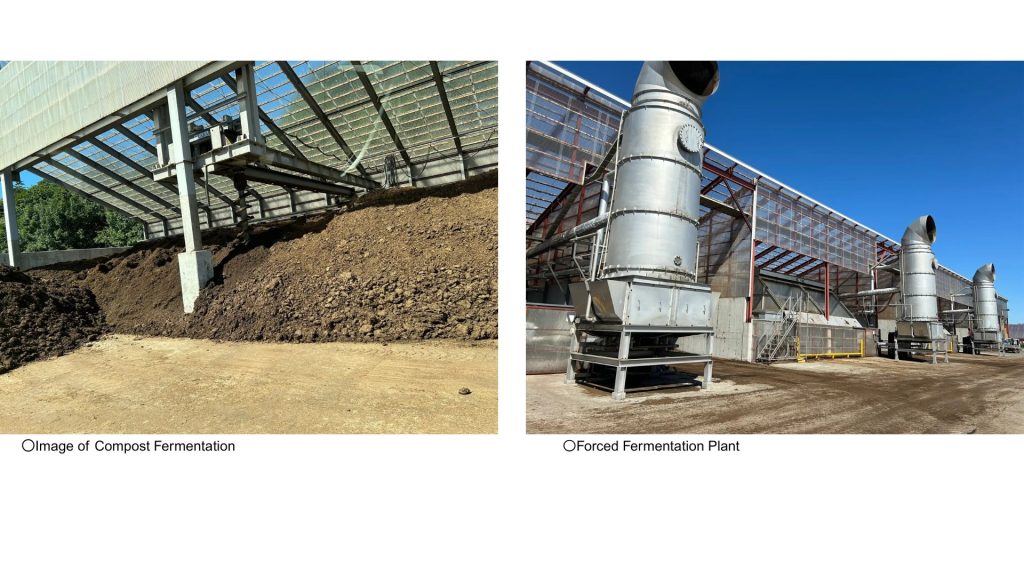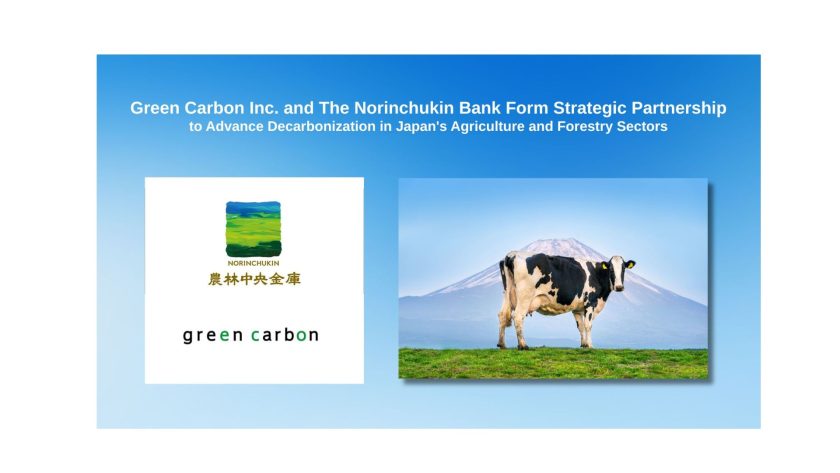~A Partnership to Reduce GHG Emissions and Generate J-Credits & JCM Credits in the Agriculture and Livestock Sector~
TOKYO, JAPAN – Green Carbon Inc. (CEO: Jun Okita; hereinafter “Green Carbon”), a leader in the development and sale of nature-based carbon credits, today announced that it has entered into a business partnership agreement with The Norinchukin Bank (President and CEO: Taro Kitabayashi; hereinafter “The Norinchukin Bank”).
This partnership is aimed at promoting the reduction of greenhouse gas (GHG) emissions and enhancing revenue streams through carbon credits. The collaboration will focus on supporting the generation of nature-based carbon credits primarily within the agriculture, dairy, and livestock sectors, leveraging both Japan’s J-Credit Scheme and the Joint Crediting Mechanism (JCM*1).
Through the initiatives under this agreement, Green Carbon and The Norinchukin Bank are committed to contributing to the realization of a carbon-neutral society.
〇For inquiries regarding this release and for further details, please contact:
○To download the Green Carbon Inc. Company Profile, please click here.
◆Background of this Partnership Agreement
Green Carbon is dedicated to generating nature-based carbon credits, with a primary focus on Southeast Asia. The company operates a wide range of projects, including forest conservation, rice paddies, mangrove reforestation, bovine eructation (burp) reduction, and biochar initiatives. Notably, its domestic rice paddy project achieved Japan’s largest scale J-Credit certification (approx. 6,220 tons3) in fiscal year 2023, utilizing a methodology (2) that was a first for Japan. The project is scheduled to expand to approximately 40,000 hectares (an estimated 90,000 tons) in fiscal year 2024, with further expansion to approximately 100,000 hectares (an estimated 200,000 tons) planned for fiscal year 2025.
Meanwhile, The Norinchukin Bank has established its Purpose (reason for being) as: “Dedicated to sustaining all ‘life.’ – Nurturing the agriculture, forestry, and fisheries industries, creating a prosperous future for food and lifestyles, and contributing to a sustainable global environment, together with all our stakeholders.” To realize this Purpose, the bank has identified key material issues, including “achieving a decarbonized society” and “strengthening the earning power of the agriculture, forestry, and fisheries industries.” In collaboration with its stakeholders, the bank is actively advancing initiatives to reduce GHG emissions in the agri-livestock sector.
This partnership will create synergy by combining Green Carbon’s know-how and proven track record as a carbon credit developer with The Norinchukin Bank’s extensive network in the agri-livestock sector. Together, we will introduce GHG reduction solutions to agricultural and livestock producers and propose pathways for monetization through the creation of nature-based carbon credits.
Looking ahead, we will also promote the use of JCM credits, which can be applied to Japan’s Nationally Determined Contribution (NDC), to further accelerate the decarbonization of Japan’s agri-livestock industry.
◆Mechanism for Generating J-Credits from Livestock Manure
The J-Credit methodology used in this initiative is “Changes in livestock manure management methods (AG-002).” This framework involves installing forced fermentation equipment for poultry, swine, and cattle manure. This technology accelerates the fermentation process, thereby reducing emissions of methane (CH₄) and nitrous oxide (N₂O) that occur during decomposition. The quantified reduction is then certified as J-Credits.
While the introduction of forced fermentation equipment can drastically shorten the manure fermentation period—which typically takes about six months—and can halve the labor required for manure processing, its adoption has been limited. The primary barrier is the significant upfront investment cost required for the equipment, resulting in very few producers currently utilizing this methodology.
To address this challenge, Green Carbon is establishing a project investment-type scheme, starting first in the dairy sector. This model covers the initial costs of the forced fermentation equipment as well as the fees for J-Credit registration, application, and certification. The goal is to reduce the initial financial burden on producers while enabling them to reduce their GHG emissions and secure a secondary income through a share of the revenue from J-Credit sales.

◆Future Outlook
Through this partnership, we will move forward to expand the sale of agriculture-derived carbon credits both domestically and internationally. We will also collaborate with partners across the value chain to reduce emissions, aiming not only to advance our credit initiatives but also to achieve semi-permanent Scope 3 reductions for each business involved.
*1 Joint Crediting Mechanism (JCM) The JCM is a system in which Japan contributes to greenhouse gas emission reductions in partner countries by facilitating the diffusion of its advanced decarbonization technologies. The resulting emission reductions are then used to help both Japan and the partner country achieve their respective climate targets.
**2, 3 According to research by Green Carbon Inc.
◆ Green Carbon, Inc.
Representative :Jun Okita, CEO
Location :2-3-2 Kojimachi, Chiyoda-ku, Tokyo, Hanzomon PREX North 9F WeWork
Establishment :December 2019
Business :Carbon credit creation and sales business, agriculture-related business, environment-related business, other related businesses and ESG consulting business
URL : https://green-carbon.co.jp/
◆About Green Carbon, Inc. Business
Green Carbon operates with the vision of “Saving the Earth with the Power of Life,” providing comprehensive support from carbon credit creation, registration, to sales. Additionally, we are involved in agriculture-related businesses, research and development, ESG consulting, among others. Our main focus is on generation carbon credits through methane gas reduction in rice paddies, where we have obtained certification for J-Credits, the first and largest in Japan (approximately 6,220 tons), and plan to expand to around 50,000 hectares in the fiscal year 2024. We also offer a service called “Agreen” that integrates credit registration, application, and sales into one platform, simplifying procedures such as application registration and document preparation, thus reducing the workload for credit creators.
◆The Norinchukin Bank
Representative: Taro Kitabayashi, President and CEO
Location: Otemachi One Tower, 1-2-1 Otemachi, Chiyoda-ku, Tokyo
Established: December 20, 1923
Business Activities: A national-level financial institution for cooperative organizations, whose members include Japan Agricultural Cooperatives (JA), Japan Fishery Cooperatives (JF), and Japan Forest Owners’ Cooperatives (JForest).
URL: https://www.nochubank.or.jp/en/

